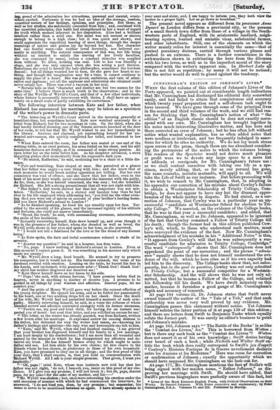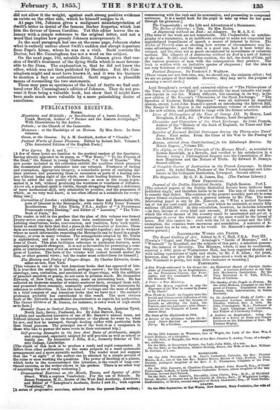CURNINGHA.31I'S EDITION OP JOHNSON'S
WHEN the first volume of this edition of Johnson's Lives of the Poets appeared, we pointed out at considerable length indications that Mr. Cunningham had discharged his editorial duty somewhat easily, and had failed to attain that completeness and accuracy which twenty years' preparation and a self-chosen task ought to have insured. We have gone through some of the principal lives in the second and third volumes of the work, and we still find rea- son for thinking that Mr. Cunningham's notion of what " the edition" of an English classic should be does not exactly corre- spond with our own. Mr. Cunningham has brought together in has notes much interesting illustrative matter, and has here and there corrected an error of Johnson ; but he has often left without notice what wanted explanation, has as often added notes that were needless or irrelevant, and too frequently indulged in asser- tions for which he cites no authority. We do not lay much stress upon errors of the press, though these are too abundant consider- ing the pretensions of the series to which the volumes belong. The readers of the Spectator would not derive much pleasure or profit were we to devote any large space to a mere list of addenda et corrigenda for Mr. Cunningham's future use so we shall content ourselves with taking one life as a spe- cimen, merely adding, that, so far as our perusal has gone, the same remarks, mutatis mutandis, will apply to all. We will take the Life of Swift as our instance. But before proceeding with it, we wish to remark to Mr. Cunningham, that, in adopting in his appendix our correction of his mistake about Cowley's failure to obtain a Westminster Scholarship at Trinity College, Cam- bridge, he does not appear to have any but the dimmest appre- hension of the whole matter in dispute. He had stated, as a cor- rection of Johnson, that Cowley was in a particular year an un- successful " candidate at Westminster School for election to Tri- nity College." We asserted, on the evidence of the College books, that he was in that year a successful candidate; and added, that Mr. Cunningham, as well as Dr. Johnson, appeared to be ignorant of the fact that Cowley remained a Fellow of Trinity College till his death ; though the former had in this edition published Cow- ley's will, which, to those who understood such matters, must have conveyed the evidence of the fact. Now Mr. Cunningham's acknowledgment of his mistake in his "Additional Notes" is this, " It appears from Cowley's will that he was subsequently a suc- cessful candidate for admission to Trinity College, Cambridge!' The word "subsequently" shows that Mr. Cunningham does not apprehend the point of our correction; and the phrase " cm/mis- t:on " equally shows that he does not himself understand the evi- dence of the will, which he here cites as if his own sagacity had led him to the discovery. The College books show that, not subse- quently, but in the year in question, Cowley was not only admitted to Trinity College, but a successful competitor for a Westmin- ster Scholarship. And the will shows that he was not only ad- mitted, but that he became a Fellow of the College, and retained his fellowship till his death. We have dwelt minutely on this matter, because it furnishes a good gauge of Mr. Cunningham's depth and accuracy of research.
At page 164 volume iii, Dr. Johnson states that Swift never owned himself the author of the " Tale of a Tub," and that such authorship was never very well proved by any evidence. Mr. Cunningham passes this statement without notice. Yet Johnson himself refutes the latter portion of it at page 159 of this edition ; and there are letters from Swift to Benjamin Tooke which equally refute the former part. It was surely =editor's business to point out Johnson's mistake.
At page 165, Johnson says "' The Battle of the Books' is so like the ' Combat des Livres,' &c." This is borrowed from Wotton ; but is there any such book as the " Combat des Livres "? Wotton does not assert it as of his own knowledge ; Swift denies having ever heard of such a book ; while Nicholls and Walter Scott en- title the book which does really correspond to Swift's jeu d'esprit " Coutray's Histoire Poetique de in Guerre novellement declare() entre les Anoiens et les Moderns." Here was room for correction. or oonfirmation of Johnson ; exactly the opportunity which we should have supposed Mr. Cunningham on the look-oat for. At page 177, Mr. Cunningham mentions the fact ?f Stella'e will being signed with her maiden name, " Esther Johnson," as dis- proving her marriage with Swift. He should have added, that Swift's previous biographers were perfectly aware of this fact, but
• Lives of the Most Eminent English Poets, with Critical Observations on their Works. By Samuel Johnson. With Notes corrective and explanatory, by Peter
Cunningham, F.S.A. Volumes II. and W. Published by Murray.
did not allow it the weight, against such strong positive evidence as exists on the other side, which he himself assigns to it.
At page 184, Johnson gives a malignant misinterpretation of Swift's letter in denial of the famous Barber forgeries, which lost him the favour of Queen Caroline. Yet this editor leaves the ca- lumny with a simple reference to the original letter, and not a WOrd that implies how grossly Johnson misrepresents it. In the next paragraph but one on the same page, Johnson states what is entirely untrue about Swift's sudden and abrupt departure from Pope's house, where he was on a visit. Scott corrects the Doctor, but Mr. Cunningham has not a word on the subject.
On the next page, 185, mirabile dicta, Johnson gives that ver- sion of Swift's treatment of the dying Stella which is most favour- able to the Dean. The explanation is, that he did not know the other, which was not then published by Sheridan. But Mr. Cun- ningham might and must have known it, and it was his business to mention a fact so authenticated. Scott suggests a plausible means of reconciling the two statements. These may pass as specimens of the kind of faults we find scat- tered over Mr. Cunningham's edition of Johnson. They do not pre- vent it from being a valuable book, but show that it might have been made much more valuable by a more painstaking desire of excellence.



























 Previous page
Previous page